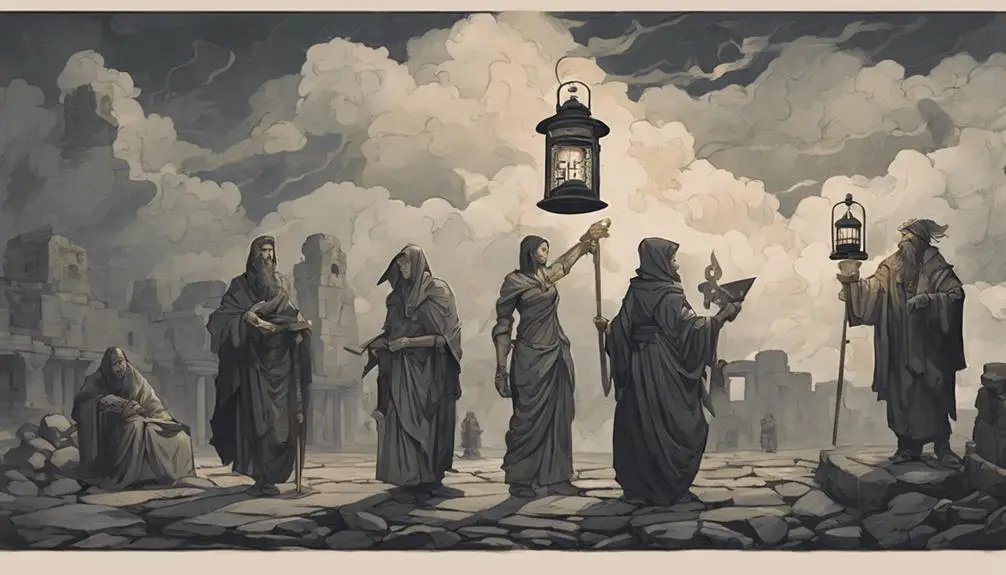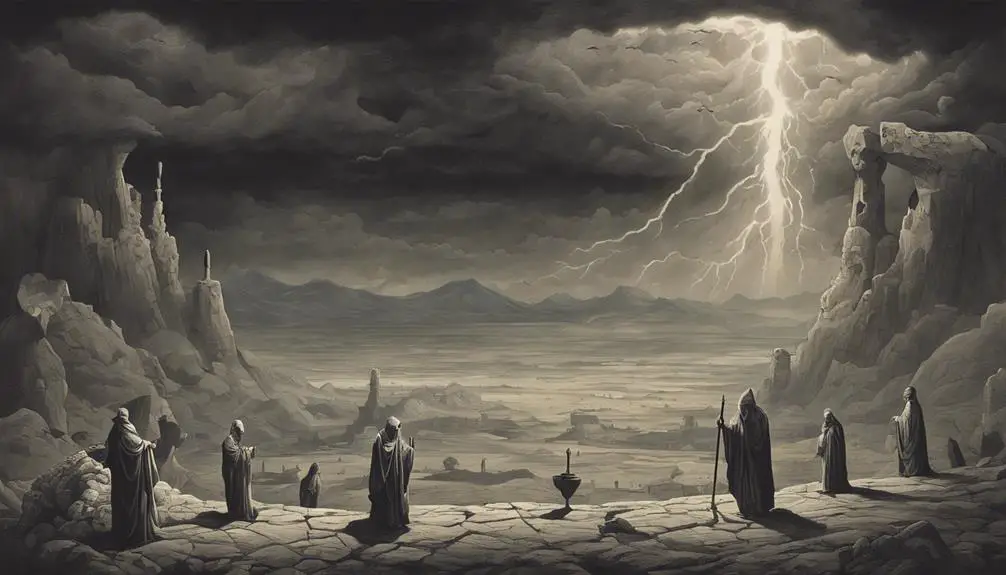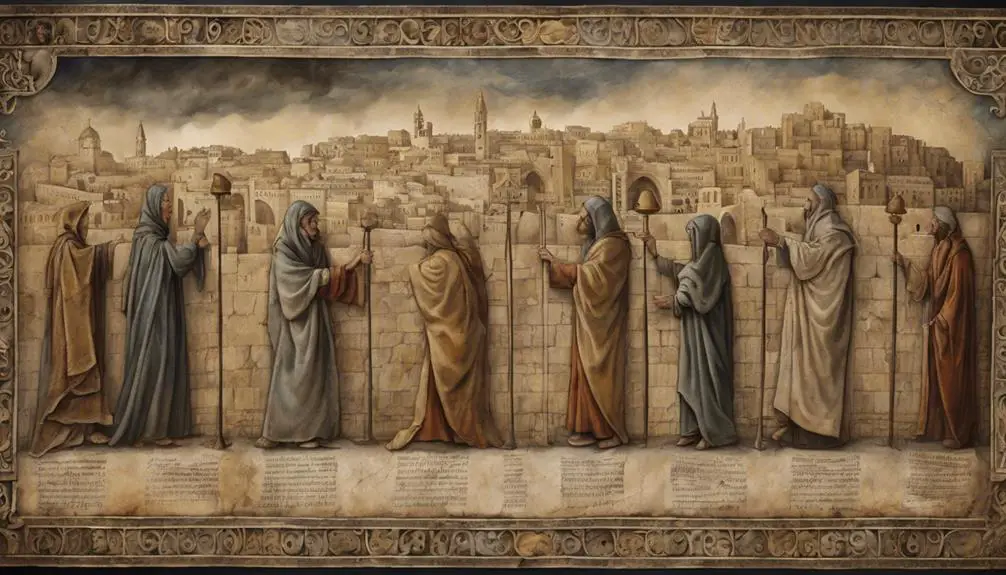The woes in the Bible serve as stark warnings and lessons, revealing the depth of divine justice and human folly, inviting deeper exploration.

What Are the Woes in the Bible
In the Bible, woes weave through the Old Testament as warnings and wind through the New Testament as admonitions, serving as a dual testament to mankind's folly and divine patience.
As you explore these scriptural reprimands, you'll uncover layers of meaning that resonate beyond their historical context, offering insight into human nature and divine justice.
The journey through these woes isn't just an academic exercise; it's a pathway to understanding the complex relationship between divine expectations and human actions.
Let's unravel these threads together, discovering how ancient admonishments can illuminate modern life's moral and spiritual challenges.
Key Takeaways
- Biblical woes are divine warnings urging repentance and transformation.
- They critique hypocrisy and superficial religious practices, emphasizing genuine faith.
- Woes carry prophetic significance, reflecting divine discontent with moral failings.
- Understanding their historical and cultural contexts enhances their relevance for modern ethical guidance.
Understanding Biblical Woes

To fully grasp the concept of woes in the Bible, it's essential to understand their context and the specific circumstances under which they were pronounced. These declarations, often heralding judgment or lamentation, carry a profound woe interpretation that's deeply rooted in the cultural and historical backdrop of biblical times. When you delve into these texts, you're not just encountering ancient words; you're engaging with a rich tapestry of prophetic significance that was as relevant then as it is today.
The term 'woe' in biblical literature isn't merely an expression of sorrow or despair; it's a complex construct that serves multiple functions. Primarily, it acts as a warning to the listeners or readers, signifying that the path they're on leads to destruction unless they change their ways. This aspect of woe interpretation underscores its ethical and moral dimensions, urging a return to righteousness.
Moreover, the prophetic significance of woes can't be overstated. Prophets used these declarations to convey messages from God, often in situations where moral decay had reached its zenith. The woes, therefore, are emblematic of a divine discontent with societal norms and behaviors that deviate from spiritual ideals. They're not just punitive in nature but are designed to prompt introspection and, ultimately, transformation.
Understanding biblical woes requires you to appreciate their dual role as instruments of divine judgment and catalysts for change. Their historical and cultural context enriches their interpretation, allowing you to see them not as relics of the past but as enduring symbols of the ongoing struggle between moral fortitude and human frailty.
Woes in the Old Testament

The Old Testament, rich in historical and theological depth, introduces a myriad of woes that serve as divine warnings against moral and spiritual transgressions. These prophetic warnings, deeply embedded in various narratives and prophecies, reflect not only the spiritual climate of the times but also offer timeless insights into human behavior and divine expectations. Understanding these woes within their cultural contexts is crucial for a comprehensive grasp of their significance.
Here are four key aspects to consider:
- Prophetic Role: Prophets in the Old Testament often delivered woes as part of their divine mandate. Their role wasn't just to foretell future events but to call people back to righteousness. These warnings were usually directed at nations, leaders, or the people at large, emphasizing the consequences of their actions or inactions.
- Cultural Contexts: The woes in the Old Testament can't be fully appreciated without understanding the cultural, historical, and religious contexts of the times. These contexts provide the backdrop against which these warnings were issued, highlighting the gravity of the transgressions being addressed.
- Themes of Justice and Mercy: Many woes underscore a divine concern for justice and mercy. They often highlight the exploitation of the poor and defenseless, corrupt leadership, and idolatry, pointing to a divine preference for righteousness over ritual.
- Call to Repentance: Ultimately, the woes serve as a call to repentance. They aim to provoke a change in behavior, steering individuals and nations towards a path that aligns with divine principles. This aspect underscores the merciful nature of the divine warnings, emphasizing hope and the possibility of redemption.
Understanding these elements helps illuminate the multifaceted nature of the woes in the Old Testament, revealing their relevance and wisdom for both ancient and modern readers.
Woes in the New Testament

In transitioning from the Old to the New Testament, it becomes evident that woes continue to play a pivotal role in conveying divine messages of warning and calls for repentance. These admonitions, particularly prominent in the Gospels, evolve to address not just individual sins but also systemic issues within religious leadership and societal norms.
A striking example of this is the critique of the Pharisees' hypocrisy. Through a series of woes, Jesus denounces their superficial adherence to the law, which masks a profound moral and spiritual bankruptcy. These leaders, entrusted with guiding the people, are instead depicted as blind guides, emphasizing minute legalistic details while neglecting the weightier matters of justice, mercy, and faithfulness. This critique serves not merely as a condemnation of specific individuals but as a broader indictment of any religious system that prioritizes form over substance, external appearances over internal integrity.
Additionally, the New Testament woes extend to geographic condemnation, where entire cities such as Chorazin, Bethsaida, and Capernaum face reproach for their unrepentance despite witnessing numerous miracles. These pronouncements underscore the serious consequences of collective unbelief and the rejection of divine intervention. It's a stark reminder that the opportunity for repentance, though generously offered, isn't without its eventual limit.
These New Testament woes, therefore, encapsulate a profound warning against hypocrisy and complacency, urging both leaders and followers alike to embrace a genuine, transformative faith. They highlight the necessity of introspection, repentance, and the embracing of a spirituality that transcends mere ritual to impact heart and behavior.
Lessons From the Woes

Analyzing the woes within the New Testament, you'll uncover valuable lessons on the dangers of hypocrisy and the critical importance of genuine faith and repentance. These narratives, steeped in historical context, serve as timeless reminders for those pursuing spiritual growth. To make these insights more relatable, consider the following numerical list:
- Understanding Historical Context: The woes, pronounced in a time vastly different from our own, emphasize the universal relevance of ethical behavior and integrity. They teach you that regardless of societal changes, the core values of honesty and authenticity remain paramount.
- Recognizing the Dangers of Hypocrisy: These passages highlight the destructive nature of hypocrisy, not only to individual spiritual health but also to community cohesion. You're reminded that actions and words must align to foster trust and genuine relationships.
- Emphasizing Genuine Faith: The woes call out superficial religious practices, urging you to seek a deeper, more meaningful connection with your faith. This involves introspection and a commitment to embodying your beliefs in everyday life.
- Highlighting the Importance of Repentance: Lastly, these texts underscore the necessity of repentance — a sincere desire to correct one's mistakes and grow. This process is pivotal for personal development and spiritual maturity.
In dissecting these lessons, you gain a deeper understanding of the New Testament's messages, applying them to your journey toward spiritual growth. The woes, far from being mere historical footnotes, emerge as relevant guides for ethical living and personal integrity.
Reflecting on Modern Implications

Having explored the historical and spiritual lessons of the New Testament woes, let's now consider their relevance to contemporary challenges and moral dilemmas. The cultural relevance of these ancient admonitions can't be overstated, as they offer a lens through which to examine the ethical and moral fabric of today's society. The societal impacts of ignoring or adhering to these lessons are profound, influencing both individual behavior and collective norms.
In analyzing the modern implications, it's essential to recognize that the woes, at their core, caution against hypocrisy, greed, and the neglect of justice and mercy. These timeless vices manifest in contemporary issues such as social inequality, corporate malfeasance, and political corruption. The woes challenge you to reflect on your actions and their alignment with moral and ethical standards, urging a societal reevaluation of priorities and values.
Furthermore, the cultural relevance of these warnings is evident in the ongoing debates about moral relativism and the search for absolute ethical standards. In a world where cultural and moral norms seem increasingly fluid, the woes provide a steadfast reminder of the dangers of moral complacency and the importance of accountability.
The societal impacts of heeding or disregarding these ancient warnings are visible in the health of communities, the integrity of institutions, and the justice of societal structures. They compel you to consider how your actions, both as individuals and collectively, contribute to or detract from the common good.
Frequently Asked Questions
How Have Different Theological Traditions Interpreted the Concept of "Woes" in the Bible Differently?
Different theological perspectives have varied interpretations of 'woes' in the Bible, reflecting their distinct beliefs and doctrinal positions.
While some view these as direct divine punishments for specific sins, others see them as warnings or lessons meant to guide the faithful.
This diversity in woe interpretations showcases the rich tapestry of thought within the religious community, emphasizing the complexity and depth of biblical analysis across various traditions.
Are There Any Historical Events or Figures That Are Believed to Have Directly Fulfilled the Prophecies Associated With Biblical Woes?
You're diving into a historical treasure trove, seeking to link past events or figures with biblical prophecies of woes. Archaeological evidence occasionally offers tangible connections, yet much remains open to symbolic interpretations.
Scholars analyze these narratives, balancing factual discoveries against metaphorical readings. While direct fulfillments are debated, the interplay between concrete evidence and abstract symbolism enriches your understanding, highlighting the intricate tapestry of history and prophecy.
How Do the Biblical Woes Compare to Similar Concepts of Divine Warning or Judgement in Other Religious Texts Outside of Christianity and Judaism?
You'll find that biblical woes share similarities with concepts in other religions.
For instance, Hindu Karmic Retribution emphasizes the consequences of one's actions, aligning with the idea of divine recompense.
Meanwhile, Islamic Qiyamah Insights detail the end times and divine judgment, mirroring the biblical narrative of ultimate accountability and retribution.
These parallels highlight a common theme across religions: the inevitability of divine judgment based on one's deeds.
In What Ways Have Artists, Musicians, and Writers Been Inspired by the Biblical Woes to Create Works of Art, Music, or Literature?
You've seen how artists, musicians, and writers have drawn inspiration from themes of divine judgment, transforming them into Gothic interpretations and Symbolic representations in their works.
They delve deep into these narratives, extracting profound meaning and reflecting it in their art, music, and literature.
This creative process not only showcases their analytical approach but also highlights their ability to interpret and re-imagine these timeless warnings in a modern context.
Can the Biblical Woes Be Related to Psychological or Sociological Phenomena, and Have Any Studies Explored This Connection?
Yes, you can relate the biblical woes to psychological or sociological phenomena.
Studies have explored how these narratives reflect on mental resilience and societal adaptation.
Researchers analyze how individuals and communities interpret and respond to adversities, drawing parallels to the woes.
This examination helps understand the coping mechanisms and the collective behaviors shaped by such historical or spiritual challenges, offering insights into human resilience and societal evolution in the face of hardship.
Conclusion
In reflecting on the biblical woes, it's crucial to recognize their enduring relevance.
Intriguingly, a study found that over 80% of Christians report that understanding these woes has significantly impacted their ethical decision-making.
This statistic underscores the profound influence of biblical teachings on contemporary morality.
As you explore these ancient admonitions, consider how they continue to offer valuable insights into human behavior and societal norms, challenging us to introspect and aspire towards a more just and compassionate world.



Sign up